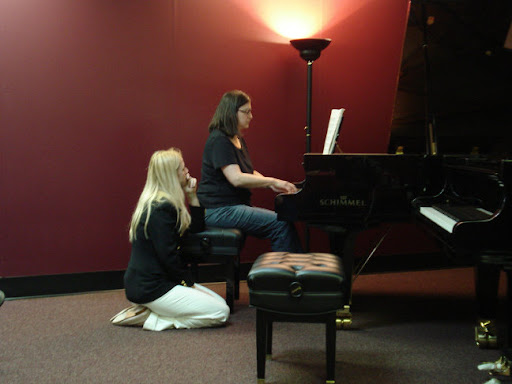When the AMSF master class with Brian Ganz was first scheduled in February, it was snowmageddoned out; then when it was rescheduled in the spring Brian had a death in the family, and it had to be canceled again. It finally took place this past Sunday. It was bracketed by one of the hottest July 25ths on record and a short but incredibly destructive storm, which hit right in the middle of the class, causing the power to go out -- but our hosts cranked up a generator and lit some candles, and we kept going.
In any case, Brian was exactly as I remembered him from almost 30 years ago when he accompanied some of my student recitals: warm, enthusiastic, full of fanciful but helpful imagery, and extremely knowledgeable about music and the piano.
They put me first -- perhaps because I was playing the easiest piece, the Brahms Op. 118 No. 2. I played from memory, and it went well except for the pianissimo hymnlike section in the middle, during which I realized I had hit the sostenuto pedal instead of the una corde pedal, and it threw me off and I messed up the second phrase of it.
The things Brian talked about were understanding how Brahms developed the music, asking questions like, "What makes this version of this theme different here?" He talked about "juxtaposition," by which he meant playing related sections of music side by side to make these kinds of comparisons. He also talked about voicing, and suggested practicing something he called "ghost playing": sounding only one voice while lightly pressing the keys of the other notes without having them sound. He mentioned something suggested by his teacher Leon Fleischer when he was studying the opening of Beethoven's fourth piano concerto: imagine you have two cherubim, one tucked under each arm, and they are blowing on the keys.
The musical analysis he suggested is actually something I tend to do automatically, but it was nice having it reinforced. Any advice on varying touch, though, is really valuable; the piano's weakness as an expressive instrument is its percussiveness and the tendency for playing to be plunky. The ghost-playing technique is very difficult, requiring a lot of control, and it's something I'm definitely going to start practicing -- just a bit at a time, though.
In the interests of confidentiality (because I don't know how they would feel about having their performances analyzed on the Internet), I won't go into detail about the other five people who participated. Let's just say that they played interesting pieces and were well prepared. I also applaud the intrepid audience (including my husband), who sat through 3 1/2 hours of master class and were still awake at the end.
The buffet afterward was excellent, conversation was lively. So all in all, a good experience.
A northern dream comes up in lights
5 hours ago

